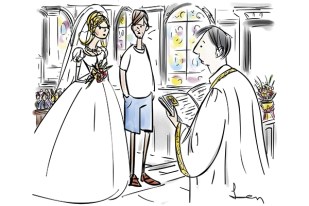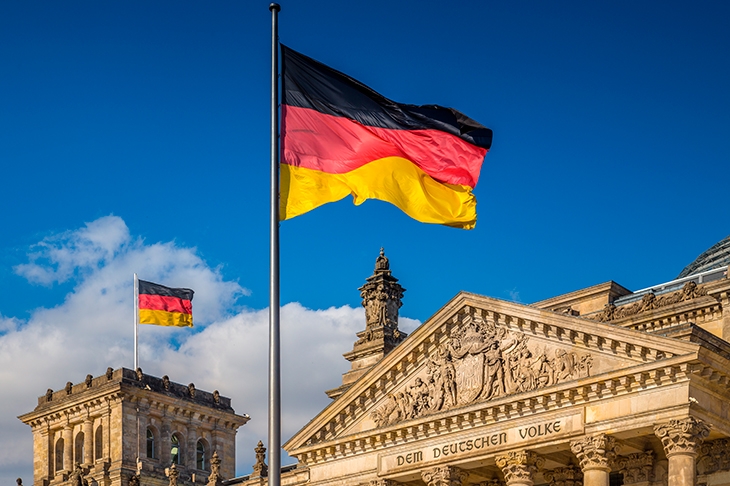The British romance with Germany has always been an on-off affair.
At the turn of the century, Kaiser Bill enjoyed brief popularity, based on dynastic ties, until his bombastic militarism set Germany on a path to war. Thirty years on, as Tim Bouverie reminds us in his book Appeasing Hitler, many in the English ruling class favoured Nazi Germany over revanchist France. After the war, Rhenish capitalism, Germany’s social contract between management and labour, appeared to offer a soothing alternative to strike-torn Britain. Then Mrs Thatcher arrived with stiffer medicine.
John Kampfner’s Why the Germans Do It Better is a beguiling title because the British have undoubtedly hit a bad patch. Three prime ministers in five years; a resurgent separatist movement in Scotland; a political class unmoored by Brexit. Germany, says Kampfner, is a grown-up country, while Britain is characterised by ‘hubris, monolingual mediocrity, a moribund political system, delusions of grandeur, infantile and improvised politics, and an absence of rules’. Phew!

Germany, anchored in the EU at the heart of Europe, does look like a model of stability and prosperity by comparison. Angela Merkel’s calm professionalism contrasts with Boris Johnson’s fumbling response to the Covid pandemic. On a host of issues — apprenticeships, export-driven medium-sized businesses, high culture (Merkel goes to the opera, we hear, Cameron watches the telly) — the Germans score more highly than the UK, just like their metronomically successful national football team.
Kampfner roams widely in Germany and has a reporter’s ear for the telling anecdote. He knows his history too, having first served as a foreign correspondent in East Berlin before the fall of the Wall. He cites four post-war achievements for modern Germany: rehabilitation and economic recovery, seeing off Baader-Meinhof terrorism; reunification and the two trillion euro absorption of the former communist east, and Merkel’s grand gesture welcoming more than one million refugees in 2015. He might have added the creation of a humane bureaucracy — an unthinkable prospect after the depredations of Nazism and the corruption of the German state.
Germany’s success story is remarkable, but Kampfner does not give enough credit to enlightened American leadership. President Truman (and the US commander on the ground, Lucius Clay) refused to impose a Carthaginian peace after the second world war and wanted the Germans to become ‘citizens of the world again’. President Bush senior played an indispensable role in managing German reunification. The Allies were also critical in encouraging the ‘consensus culture’, via a new constitution which Kampfner cites as a vital shock absorber in the political system.
Consensus politics has indeed delivered stability for 70 years, but there are stirrings on the far left and, notably, on the far right, where the Alternative für Deutschland (AfD) is the main opposition party in the Bundestag. Opening the borders to refugees, mainly from Syria, fuelled a sharp increase in anti-immigrant sentiment. Merkel was acclaimed as a humanitarian champion abroad, but at home her reputation only recovered after Covid.
The consensus culture’s flaws are most evident in corporate Germany. Two mega-scandals — Wirecard and Volkswagen — have exposed a cosy, insulated business culture hostile to anything which might challenge its most cherished habits or methods. Germany lags as a result in high technology companies — a serious weakness. Kampfner fails to mention Wirecard, once touted as Germany’s rival to Silicon Valley’s PayPal; but he does admit that Germany needs to strengthen its financial services industry. That’s only half the story. Germans have no stomach for financial capitalism. That’s why they have failed to develop capital markets, and why Frankfurt’s claim to rival the City of London is absurdly inflated.
The VW diesel emissions scandal is perhaps even more egregious. Germany’s automaker engaged in systematic cheating to evade diesel emissions standards. So far it has paid out 30 billion euros in fines and costs. The blame lies in a rotten corporate culture with its deep connections between management, workers and local politicians (and family ownership). This is the consensual system which Kampfner would presumably like to export to the UK, minus, of course, the corruption.
Toward the end of the book, Kampfner muses on the need for German leadership amid the crisis of liberal democracy. That is an uncomfortable prospect for many Germans who — to revive the old phrase — preferred being an economic giant and a political dwarf. Who or what comes after Merkel, now almost 15 years in power, is a big unknown.
My suspicion is that the Germans, left alone with France, the Club Med countries and unruly eastern neighbours, will miss the British presence in the councils of Europe. Brexit has unbalanced the UK, but also the EU. German power will likely increase, not diminish. That means we need to know more about Germany and the Germans, even if we do not always follow them.






Comments